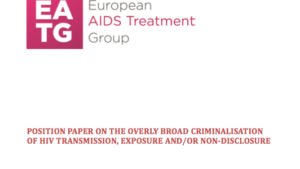Overview
There is no HIV-specific criminal law in Türkiye, however general criminal laws have been used to prosecute alleged HIV transmission.
Türkiye’s Supreme Court of Appeals established the use of ‘intentional injury’ following a 2004 case which involved a man prosecuted for the transmission of HIV to his wife. The case was initially handled as attempted murder but the Supreme Court of Appeals found him guilty of the lesser crime of intentional injury and he was sentenced to eight years’ imprisonment.
The Court established that to be found guilty of ‘intentional injury’ you must be diagnosed HIV-positive, have condomless sex, and have not disclosed your HIV-positive status. HIV ‘exposure’ can be also be prosecuted as an attempt. It is thought that effective treatment may be considered to be a defence.
In January 2017, media reported on a crackdown in which police arrested eight woman accused of engaging in sex work. This included an Azerbaijani woman living with HIV who was implausibly said to have transmitted HIV to around 200 clients. It is not clear if any HIV-related charges were brought.
In 2018, an Istanbul court rejected murder charges pressed by the mother of an HIV-positive man who had died, and who claimed that the virus was transmitted to her son by his wife, who allegedly did not disclose her HIV-positive status. The court acquitted the defendant citing lack of evidence and causality with the death.
In December 2024, a woman brought attempted murder charges against her husband, who she alleged hid his HIV-status from her during their marriage. HIV was not transmitted.
Laws
Turkish Criminal Law
Article 86. Intentional injury
(1) A person who deliberately hurts someone else’s body or causes his health or perception ability to be impaired is sentenced to imprisonment from one year to three years.
(2) The act of intentional injury is that the victim;
a) For a disease that cannot be cured, the penalty determined according to the above article is doubled.
Acknowledgements
HIV Justice Network's Positive Destinations
Visit the Türkiye page on Positive Destinations for information on regulations that restrict entry, stay, and residency based on HIV-positive status, as well as access to HIV treatment for non-nationals.



